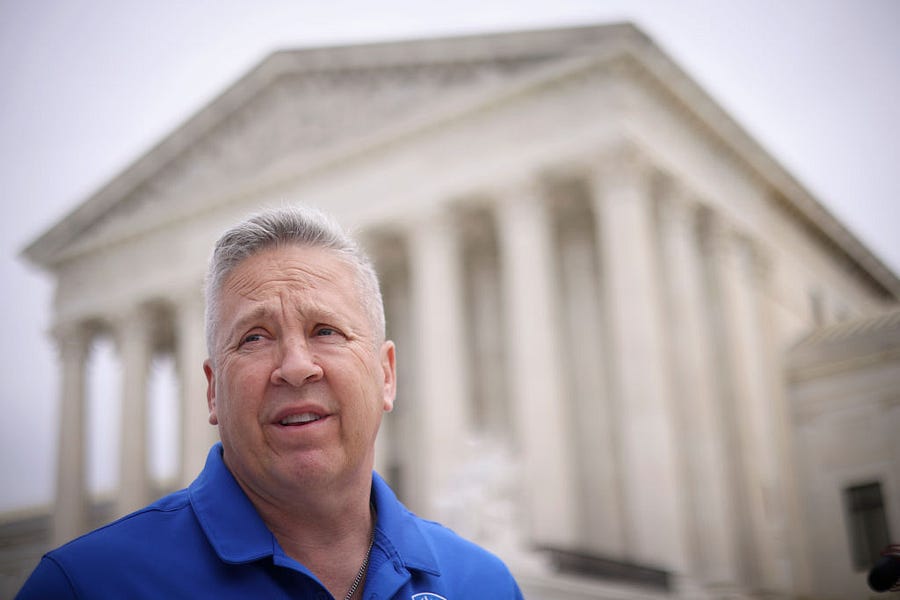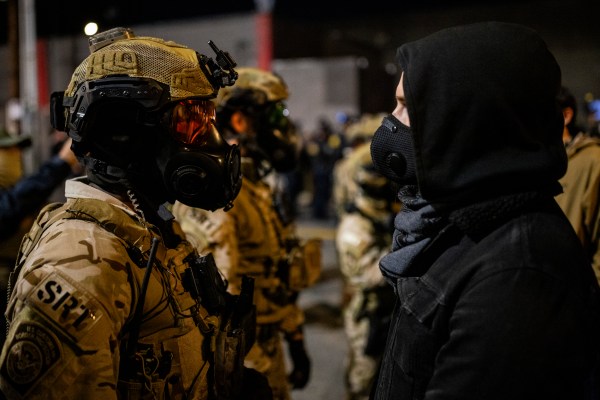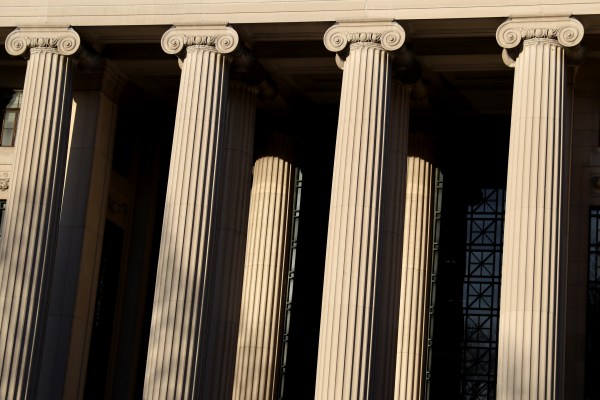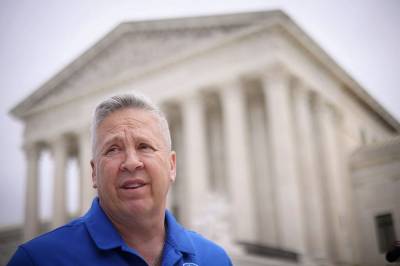Happy Wednesday! Our new favorite thing is large groups of teen boys across the country dressing up in suits to see Minions: The Rise of Gru in theaters, only to be kicked out for applauding too loudly during the opening credits.
The kids are alright (and possibly the reason the children’s movie scored the biggest ever 4th-of-July opening weekend).
Quick Hits: Today’s Top Stories
The 22-year-old man arrested in connection to Monday’s mass shooting at a 4th of July parade in Highland Park, Illinois was charged with seven counts of first-degree murder on Tuesday after an additional victim succumbed to injuries suffered during the attack. Lake County State’s Attorney Eric Rinehart told reporters “dozens more charges” will be filed against the alleged shooter, who police said fired more than 70 rounds into the assembled crowd before escaping the scene disguised in women’s clothing. Police were reportedly called to the alleged gunman’s home multiple times in recent years in response to violent threats and a suicide attempt—16 knives, a dagger, and a sword were confiscated from him in 2019—but the man legally purchased as many as five guns from licensed dealers in the Chicago area in 2020 and 2021.
Finland and Sweden were formally invited to join the NATO alliance on Tuesday as delegations from member countries gathered in Brussels to sign “accession protocols,” which must now be ratified by each countries’ national parliament in the coming months. In the meantime, Finland and Sweden are now able to participate in most NATO activities, other than nuclear planning sessions and certain intelligence briefings. The alliance’s mutual-defense pact also won’t apply to the Nordic countries until the membership process is completed.
Two of British Prime Minister Boris Johnson’s Cabinet ministers—and several more junior officials—resigned on Tuesday after Johnson’s spokesman admitted the leader had been told about sexual misconduct allegations against Conservative MP Chris Pincher, but took no action and ultimately promoted him. Pincher resigned this weekend after the allegations became public. Combined with the lingering Partygate fallout, this latest scandal could spell doom for Johnson’s increasingly tenuous grip on power.
The Spanish government is increasing its military expenditures by $1 billion this year in an effort to make good on promises by Prime Minister Pedro Sanchez during last week’s NATO summit. In response to Russia’s invasion of Ukraine, Spain—which currently devotes the second-lowest percentage of its GDP to defense spending of all NATO members—plans to double its military budget to 2 percent of GDP by 2029.
The Treasury Department announced Treasury Secretary Janet Yellen held a virtual meeting with Chinese Vice Premier Liu He on Tuesday amid reports President Joe Biden is expected to announce a rollback of Trump-era tariffs on Chinese imports later this week in an effort to tamp down inflation.
Maryland Gov. Larry Hogan said Tuesday the state will drop its requirement that residents show they have “good and substantial reason” to receive a license to carry a gun after the Supreme Court struck down a similar requirement in New York last month. The ruling will affect several other states as well: Massachusetts officials announced Friday the state will no longer enforce its requirement that residents show they have “good reason” to obtain a carry license.
A Georgia special grand jury investigating efforts to overturn the state’s 2020 presidential election results subpoenaed Sen. Lindsey Graham, Rudy Giuliani, John Eastman, Jenna Ellis, and other members of Donald Trump’s campaign legal team on Tuesday. Superior Court Judge Robert McBurney signed off on the summoning documents, which describe the cohort as “necessary and material” witnesses to the investigation.
Approximately 2.5 million travelers passed through Transportation Security Administration (TSA) checkpoints on Friday, the highest daily tally since the pandemic bore down in March 2020. Travel hiccups continued, however, as nearly 2,000 flights were canceled over the holiday weekend and more than 21,000 were delayed.
Supreme Court Puts Kennedy Back in the Game
For years, Joe Kennedy—then the assistant football coach at Bremerton High School in Washington state—would walk to the 50-yard line after the game clock wound down to zero and bow his head in prayer. Little did he know those prayers would one day lead to his suspension, bring him to the highest court in the land, and make him an avatar for one of the most significant—and closely watched—religious liberty cases in years.
Writing for the 6-3 majority in Kennedy v. Bremerton School District last week, Justice Neil Gorsuch sided with the coach, comparing his prayers to a Muslim teacher wearing her hijab in class or a Christian teacher praying over her lunch—private acts permissible despite their status as public employees. “Kennedy prayed during a period when school employees were free to speak with a friend, call for a reservation at a restaurant, check email, or attend to other personal matters,” Gorsuch wrote. “He offered his prayers quietly while his students were otherwise occupied.”
The majority based its decision purely on the three games that the district cited in suspending Kennedy, concerned that his public prayers could be construed as the district endorsing a religion. “The contested exercise here does not involve leading prayers with the team,” Gorsuch wrote. “The District disciplined Mr. Kennedy only for his decision to persist in praying quietly without his students after three games in October 2015.”
But there was more to the story than those three games, as Justice Sonia Sotomayor pointed out in her dissent, including a picture of the coach hoisting a helmet mid-field while surrounded by players. The prayers began when Kennedy’s coaching career did, in 2008, and continued more or less without incident for seven years, until an employee of another high school brought the practice to the attention of Bremerton’s principal. Players occasionally asked Kennedy if they could join him, and would sometimes even invite opposing players as well. Kennedy maintains he never coerced, required, or asked students to participate, but over time, the coach’s silent prayers morphed into motivational speeches, often infused with Christian teaching.
Concerned Kennedy was in violation of the public school’s policies on religious practices, district administrators requested the coach abstain from praying with students, but allowed him to continue doing so on his own on the field as long as it “did not interfere with job responsibilities” and was “physically separate from any student activity.” Kennedy attempted to comply, waiting for his players to disperse post-game before getting down on one knee, but students, coaches, and members of the public continued to join him after games—particularly after he hired lawyers and began attracting media attention. After one game, supporters rushed the field, knocking over members of the marching band.
It was at that point the district prohibited Kennedy from engaging in any “demonstrative religious activity” that was “readily observable” to students and the public, suggesting he pray in a “private location” on school grounds instead. When Kennedy continued with his customary 50-yard-line prayer, he was placed on administrative leave—and did not return as a coach the following season.
In her dissent, Sotomayor argued that context—much of which was absent from Gorsuch’s majority opinion—was necessary to reach the correct conclusion in the case. “Properly understood, this case is not about the limits on an individual’s ability to engage in private prayer at work,” she wrote. “This case is about whether a school district is required to allow one of its employees to incorporate a public, communicative display of the employee’s personal religious beliefs into a school event, where that display is recognizable as part of a longstanding practice of the employee ministering religion to students as the public watched.”
Sotomayor’s dissent also focused on the power dynamics at play in the situation at hand. “Students face immense social pressure,” she wrote, even if they aren’t pushed to join prayers or punished for skipping them. “Students look up to their teachers and coaches as role models and seek their approval. Students also depend on this approval for tangible benefits … from extra playing time to a stronger letter of recommendation to additional support in college athletic recruiting.”
Gorsuch dismissed these concerns, arguing that—particularly following the three October 2015 games for which Kennedy was disciplined—students were free not to participate, and generally didn’t. “There is no indication in the record that anyone expressed any coercion concerns to the District about the quiet, postgame prayers that Mr. Kennedy asked to continue and that led to his suspension,” he wrote. “Nor is there any record evidence that students felt pressured to participate in these prayers. … The District asks us to adopt the view that the only acceptable government role models for students are those who eschew any visible religious expression.”
In ruling that the district had overstepped in suspending Kennedy, the Court dispensed once and for all with the “reasonable observer” standard Bremerton school officials were worried about violating. Under the so-called Lemon test established by the Supreme Court in 1971’s Lemon v. Kurtzman, lower courts decided whether a government entity had violated the Establishment Clause—the First Amendment’s prohibition on the government supporting any religion—by considering whether a “reasonable observer” could conclude that the government’s actions endorsed a religion. Lower courts continued employing the test even after the Supreme Court undermined it, prompting former Justice Antonin Scalia to compare it to “some ghoul in a late-night horror movie that repeatedly sits up in its grave and shuffles abroad, after being repeatedly killed and buried.” In this ruling, the Court officially declared it had long ago dumped Lemon and told lower courts to get on board. At last, its self-inflicted Night of the Living Dead was over.
But the Kennedy decision leaves other questions unanswered, providing no standards for how other government entities can or should restrict public employees’ religious expression on the job. “The Court refrains from deciding whether or how public employees’ rights under the Free Exercise Clause may or may not be different from those enjoyed by the general public,” Justice Clarence Thomas wrote in his concurrence. “The Court also does not decide what burden a government employer must shoulder to justify restricting an employee’s religious expression.”
But the justices definitely did decide at least one thing: Kennedy won his case, and can have his part-time coaching job back if he wants it. “This is just so awesome," he said in a statement after the ruling. “All I’ve ever wanted was to be back on the field with my guys.”
Worth Your Time
The more we learn about Monday’s mass shooting in Highland Park, the harder it is to comprehend. The Chicago Sun-Times’ Maureen O’Donnell tells the story of Aiden McCarthy, a 2-year-old boy whose parents were both killed by the gunman earlier this week. “Kevin McCarthy, 37, died protecting his son, said Michael Levberg, whose 35-year-old daughter Irina—McCarthy’s wife and Aiden’s mother—also was among the seven people killed as they watched the parade,” O’Donnell writes. “‘He had Aiden under his body when he was shot,’ the father-in-law said. When he picked up his grandson at the Highland Park police station, Levberg said Aiden told him, ‘Mommy and Daddy are coming soon.’” A GoFundMe page has been set up for Aiden, to “support him and the caregivers who will be tasked with raising, caring for, and supporting Aiden as he and his support system embark on this unexpected journey.”
With the GOP poised to regain a majority in the House after this year’s midterms, Politico’s Jordain Carney takes a look at which Republican members will be most likely to work with Democrats and keep a divided government functional. From Reps. Kelly Armstrong, Tom Cole, and Brian Fitzpatrick to Reps. Don Bacon, Young Kim, and María Salazar, Carney identifies a smattering of deal-makers-in-waiting who’ve demonstrated a penchant for legislating over bomb-throwing. “There’s a laundry list of must-pass bills next year, including funding the government, the debt ceiling, a sweeping defense policy bill and a farm bill that must be reauthorized,” Carney writes. “Republicans see other areas outside of the spotlight, including data privacy, digital assets and mental health, as equally fertile ground. … ‘I have people back home saying, ‘You can’t agree with Biden on anything.’ And I say, ‘Well what happens if he’s right every once and a while?’” Bacon said. ‘I think legislation should be win-win.’”
In a tweet over the weekend, President Joe Biden had a “simple” message for gas station owners: Bring down prices, and “do it now.” In a piece for Reason, Eric Boehm outlines the myriad problems with that logic. “It arguably lacks the pomposity of former President Donald Trump’s memorable tweet that ‘hereby ordered’ American companies to stop doing business in China, but the content is equally unhinged,” he writes. “The ‘companies running gas stations and setting prices at the pump’ in most cases aren't companies at all. More than half the gas stations in the country are single-store operations run by an individual or a family. … And those gas station owners aren’t raking in massive profits, either. Over the past five years, retailer gross margins have averaged 10.7 percent of the overall price of gas, according to NACS data. But most of those profits come from selling food, drinks, cigarettes, and the like. … ‘Selling gas generally isn’t very profitable’ due largely to intense price competition among retailers and the ease with which consumers can shop around (because they are literally in their cars). On fuel alone, gas stations have an average margin of 1.4 percent. If gas stations sold fuel at cost, consumers might hardly notice the difference—but the small-time entrepreneurs running those stations would have a harder time making ends meet.”
Meet June Huh, who dropped out of high school to become a poet—and just won mathematics’ highest prize. “He tried his best to avoid math whenever possible,” Jordan Cepelewicz writes for Quanta Magazine. “His father once tried to teach him out of a workbook, but rather than try to solve the problems, Huh would copy the solutions from the back. When his father caught on and tore those pages out, Huh went to a local bookstore and wrote down the answers there.” But when Huh did find his way back to math, he discovered something new. “Huh discovered that this kind of mathematics could give him what poetry could not: the ability to search for beauty outside himself, to try to grasp something external, objective and true, in a way that opened him up more than writing ever had. ‘You don’t think about your small self,' he said. ‘There’s no place for ego.’ He found that unlike when he was a poet, he was never motivated by the desire for recognition. He just wanted to do math.”
Presented Without Comment
Also Presented Without Comment
Toeing the Company Line
For a breakdown of last week’s EPA Supreme Court decision, be sure to check out Tuesday’s episode of Advisory Opinions! Plus: What did the Supreme Court say about Migrant Protection Protocols? And how big a deal is the election-law case the Court agreed to hear?
In the wake of Monday’s tragedy in Highland Park, David’s latest French Press (🔒) focuses on who he describes as the lost boys of American life. “The red flag law is an instrument of last resort. It’s an end-stage intervention that’s necessary when a young man is already obviously in crisis,” he writes. “The great cultural challenge of our time is preventing the crisis in the first place, and that’s going to require us to remember that when it comes to the well-being of the people around us, we are our brother’s keeper. We have to care, and we have to respond.”
On last night’s Dispatch Live, Steve, Jonah, and David discuss Monday’s mass shooting and why these things keep happening before assessing Donald Trump’s status within the Republican Party and the brewing 2024 GOP primary. Dispatch members who missed the conversation or want to listen again can access a video or audio recording by clicking here.
Let Us Know
Do you think the Supreme Court got it right in Kennedy v. Bremerton? Why or why not?







Please note that we at The Dispatch hold ourselves, our work, and our commenters to a higher standard than other places on the internet. We welcome comments that foster genuine debate or discussion—including comments critical of us or our work—but responses that include ad hominem attacks on fellow Dispatch members or are intended to stoke fear and anger may be moderated.
With your membership, you only have the ability to comment on The Morning Dispatch articles. Consider upgrading to join the conversation everywhere.